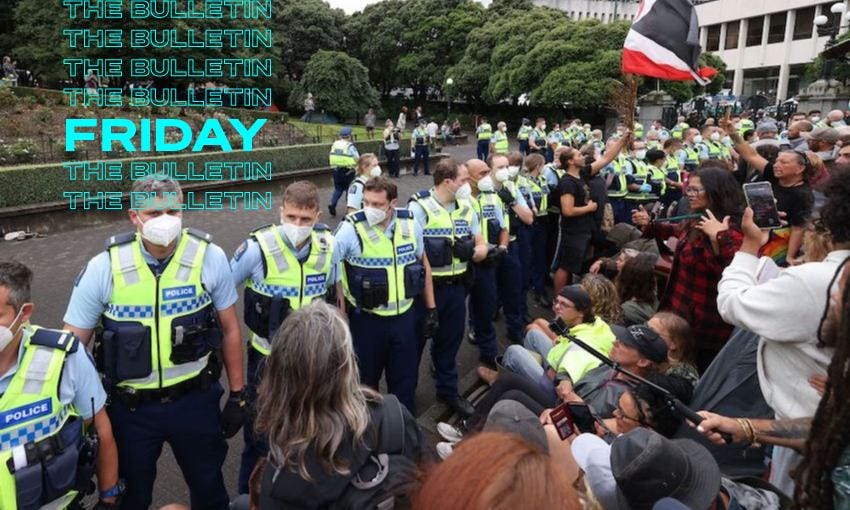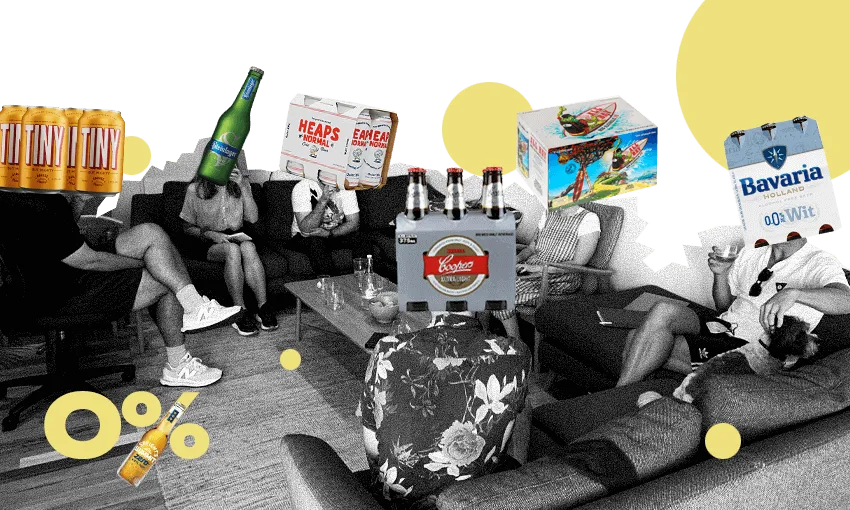When will this end?
Wellington's protest is unlikely to be over any time soon, as MPs say they won’t begin speaking with protesters until their vehicles and tents are removed
Mōrena and welcome to The Bulletin for Friday, February 18, by Justin Giovannetti. Presented in partnership with Z Energy.
In today’s edition: Health workers vote to strike; All Blacks sale gets player approval; MIQ rules loosened; but first, a look at the only option for police to end the stand-off at parliament.
Protesters have resisted police calls to leave. (Marty Melville / AFP via Getty Images)
This has to end eventually, right? That’s the question many New Zealanders are asking themselves as the protest outside parliament – now an occupation, according to the prime minister – nears its second week. What’s happening in Wellington is a largely unprecedented phenomenon, which drew its inspiration and playbook from an ongoing protest in the Canadian capital. It’s a stationary camp in the middle of one of the country’s largest cities, attempting to wage a charm offensive while simultaneously inconveniencing thousands of locals. It’s been described by some as a peaceful music festival, raising valid questions about vaccine mandates. It also includes racist elements, far-right symbols and has directed death threats at journalists and politicians. As I’ve written previously, it defies easy description.
The current state of things. There’s every indication that the occupation is settling in for a long siege. There are food markets and hairdressers setting up shop, with no request to see a vaccine pass. While the protest is largely described as anti-mandate, I’ve popped into the area around parliament a number of times over the past two weeks and I’ve yet to speak with someone who thinks Covid-19 vaccinations are safe. However, the days where a phalanx of police and protesters stood all day in opposition seem to be over at the moment. With a number of groups competing for leadership, a situation Toby Manhire describes in The Spinoff today, no one is in charge and the protest has no codified set of demands. An immediate end to all Covid-19 rules seems to be the one unifying call, along with anger at the prime minister and a fear of vaccines. Misinformation is near universal.
This will likely end in negotiation. To get a sense of the options available to police in the coming days, I spoke with Ross Hendy, a lecturer of criminology at Monash University. “It’s really difficult because we haven’t really seen anything like this before at parliament. There have been land occupations in different parts of the country at different times, the approach that has been taken there is to negotiate and naturally come to a consensus. The deep causes have to be resolved before people leave,” Hendy told The Bulletin. He stops and takes a deep breath. “It’s complex, I think.”
With a whimper, not a bang. Stuff has exclusive polling showing 30% of New Zealanders now support the protest. While some experts have warned in the Dominion Post that the protest will “fizzle” after months, there’s a need for more immediate negotiations to clear Wellington’s roads. The form of those negotiations is now being set. As One News reports, the speaker gathered all parliament’s parties to agree on how to approach the protest. In the end, they all agreed not to start a dialogue until the protest is “within the law”, by clearing all illegally parked cars, removing all structures and stopping the “intimidation of Wellingtonians”.
This could be a very slow process. There’s just no appetite in New Zealand for mass arrests and the application of overwhelming police force to clear parliament’s groups. Chris Cahill, the president of the Police Association, said as much to Newstalk ZB. He said the group camping outside parliament will probably still be there in three months, however he expects the vehicles blocking neighbouring streets will need to be cleared in the coming days. I asked to speak with Cahill, but the association said he won’t speculate on how the protest will end. I sent Cahill’s staff the interview he’d just done with ZB where he did just that. They stopped answering my emails. I’ll take the silence as a reflection of the delicate policing situation.
Police have responded to the protest over the past week by pulling back. Apart from a few constables standing on the forecourt of parliament, there’s little sense that anyone is keeping an eye on the protest any more. Even where you’d think enforcement would be heaviest, right at the foot of parliament’s front steps, protesters have hopped over two sets of temporary barricades, one plastic and the other concrete, and scrawled graffiti without so much as a verbal warning. As the police have retreated, the protest has spread further from parliament, with some protesters setting up checkpoints on the surrounding streets. Instead of police deciding who is coming in and out of the area, the protesters now are.
A message from editor Madeleine Chapman
Times are tough for a lot of people at the moment. The Spinoff is both experiencing the pinch and working hard to tell the stories from every sector. If you aren't in a position to make a contribution right now, ask your boss to consider an organisation membership.
Share the load and help us continue telling stories from all around Aotearoa, contact us today for more info on how to donate as an organisation.
10,000 health staff vote to strike amid a growing outbreak. Contact tracers and people processing Covid-19 tests are part of the thousands who have had enough, Stuff reports. There will be two days of strikes in March after 15 months of contract negotiations have gone nowhere. Health staff say they face low pay, long hours and bad working conditions, all made much worse by the hectic round-the-clock schedule brought on by Covid-19.
As the workers voted to strike, an independent report was released which found that hospitals are consistently understaffed and nurses are overworked. According to RNZ, there’s been a significant impact on patient care. The health minister blamed DHBs for the poor staffing.
Sale of minority stake in All Blacks gets player approval. American investment firm Silver Lake could own a 5.71% stake in New Zealand Rugby as part of a privatisation deal, The Guardian reports. It’ll mark the first time the governing body and All Blacks brand is not wholly publicly owned. The provincial unions and Māori Rugby board now have final say. As the NZ Herald writes, that’s a big hurdle and the deal isn’t done yet.
MIQ rules loosen as omicron bites. RNZ reports that more flexibility is coming into the border system as the director-general of health has approved a more adaptable system for risk assessment. It’ll mean more people will be able to leave MIQ earlier, with some arrivals expected to start self-isolation ahead of schedule this month. A record 1,573 cases detected in the community yesterday makes it easier for health officials to accept a little more risk at the border.
Lab capacity faces new bottleneck as pooled-processing ends. One of the many downsides of the surge in cases is that so many tests are coming back positive that labs can no longer do batches of expected negative tests together. The share of tests coming back positive soared from 0.18% a month ago to 4.87% yesterday. According to the NZ Herald, that means each sample now has to be tested separately, which means capacity will be significantly limited going forward.
The Spinoff’s Covid data tracker has the latest figures.
Minimum wage workers are now almost in the middle tax bracket. Someone on minimum wage working more than 43 hours a week is now likely to see some of those last few paycheques fall under the 30% tax rate. They would still earn more as a worker, so that’s not the issue. But as Stuff reports, it raises bigger questions about fairness in the country’s tax system and whether the brackets need to change.
Reader feedback on a ‘housing catastrophe’. A number of you responded to yesterday’s newsletter which focused on the Salvation Army’s call to deal with what it labelled a “housing catastrophe”. But first, Stuff reports this morning on a new CoreLogic report that after a drastic fall over the past year, housing affordability is now at its worst level on record.
Barbara wrote, echoing a number of readers, of a “total disillusionment with our governments” around the western world who have failed to create affordable housing. Steph said that a solution would likely require sacrifice from everyone, but “what we've failed to learn through covid is when we sacrifice for each other, we all win.” Frances added that she’d like to hear the Salvation Army on the radio each morning talking about the “acute hardship whānau are in, in the same way that Queenstown and Wellington café owners talk about their business hardship.”
Got some feedback about The Bulletin, or anything in the news?
Get in touch with me at thebulletin@thespinoff.co.nz
Right now on The Spinoff: A number of staff writers pulled down their masks and ranked the country’s best non-alcoholic beers. Robyn Hunt asks why a non-disabled person is leading the establishment of a disability ministry. Mirjam Guesgen (partnership content) writes five things you might not know about floods. Charlotte Muru-Lanning speaks with Sammy Akuthota about being a grown-up Takeout Kid.
A ‘surreal’ Black Caps bowling experience. It was a big day for bowler Matt Henry yesterday in Christchurch as he matched a benchmark set by Black Caps great Sir Richard Hadlee. RNZ has written about the test against South Africa, the first of a long series that stretches into March.






